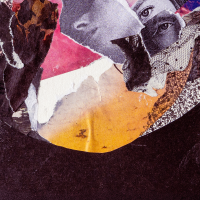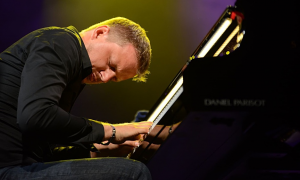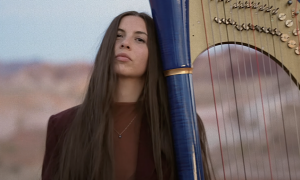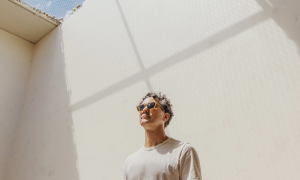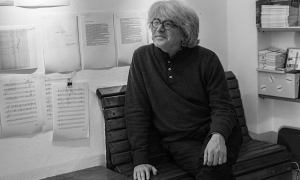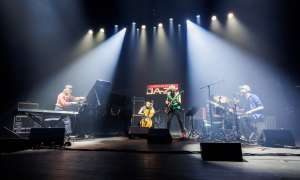Home » Jazz Articles » Interview » Yaron Stavi: Profoundly Bassist
Yaron Stavi: Profoundly Bassist
Stavi was born in Israel in 1975 and it was where he grew up. He remembers, "there was always music in my family home. Both my parents love music and listen to it a lot. During my childhood they listened mainly to classical music. They used to go to classical music concerts and took me with them at quite an early age. My first memories of music are of hearing the Israel Philharmonic Orchestra and other classical concerts." It was not only going to concerts which influenced the young Stavi. His older brother is also a musician and Stavi comments, " My older brother was already playing the piano when I was a little boy, so his playing was always there, too. I loved and lived music from as far back as I can remember. I can't remember any time when music was not a main part of my life. I fell in love with sounds and music since I was born and I still love it more than anything else."
I wondered how Stavi had come to pick up a bass and choose it as his instrument. He explained, " As I said before, my parents exposed me to music at a very early age and I am very grateful for that and thank them for it. The first instrument I played was the violin. I was six years old and chose to play it because I had heard a lot of classical music concerts and LPs. I played the violin for two years and stopped because I didn't like it enough and didn't enjoy practicing, so it wasn't the instrument for me. At the same time, when I was about 6 or maybe 8 I started to hear more kinds of music such as pop and rock and I loved it. One of the first things I heard which completely blew my mind away was the Beatles. I became pretty obsessed with their music and I still think that when it comes to songwriting, singing, harmonies, playing and so on it doesn't get any better. I am still a huge Beatles fan and listen to their music often. It is the best music and the more I listen the more I love and enjoy it. I remember as a young child being attracted to the bass playing of Paul McCartney. Another artist I became a fan of at a very young age was Bruce Springsteen. Back in the 1980s, when I was growing up, he was the biggest thing around and I loved his music. I am still a huge fan and take the chance to see him and the E Street Band live in concert when they are in London or anywhere near me. Other bands and artists I loved while growing up in the 1980s were Dire Straits, Pink Floyd, the Police, Sting, Peter Gabriel and more. There were also many great Israeli artists who inspired me to continue making music and take up different instruments. At the age of 10 I started playing the guitar. My first guitar was acoustic with nylon strings, but later I switched to an electric guitar. I got more and more into rock music. I loved the guitar and still love playing it but I was always attracted to the bass. I remember listening to CDs and watching videos of the Beatles or the Police and others and thinking, 'how cool would it be to play the bass like McCartney, Sting and others?' So when I was 15 I asked my Dad to buy me a Fender electric bass. He did and that was a dream come true. Since then I never stopped playing electric bass. With the bass I felt that I had found my instrument and my voice."
Stavi is more often than not found playing jazz and double bass these days. I wondered when he had made the switch. Stavi says, "Around the time I began playing bass, I was first exposed to jazz. I found it interesting, challenging and fascinating. It really felt like a music in which you could express a lot of things in your playing. I got more and more into jazz and realized that if I really want to play jazz, I should play the double bass. At the age of 17, I got my first double bass and started taking lessons. I actually studied classical double bass playing. This brought me back to classical music which was always there somewhere and was the place where I started from. I loved playing classical music on the double bass as well as jazz. With the double bass and the electric bass, I really felt that I found my place in music and that music found its place in me. During that time I listened a lot to jazz and got inspired by people like saxophonist John Coltrane, trumpet player Miles Davis, bass players Charles Mingus, Ron Carter, Charlie Haden and Jaco Pastorius as well as other players."
From the point of view of the bass, Stavi says his main influences are Carter, Haden, Ray Brown, Mingus, Pastorius, McCartney, m: Sting = 20901 and Red Hot Chili Peppers' bassist Brick Fleagle. "There are many more bass players who I love," he says, "but if I need to mention just a few, these would be the ones."
Though primarily influenced by the sound of the bass, Stavi has a diverse taste in music and this is reflected when he discusses what he listens to now. "I listen to quite a lot of kinds and genres of music," he says. "I guess more than anything, I like to listen to songs. Nothing does it to me more than a great song. I listen to rock and pop songs a lot. I go back and listen often to the artists that inspired me and made me play music in the first place—the Beatles; Springsteen; Stevie Wonder; the Police; vocalist, keyboard player and writer Brian Wilson and Pink Floyd. I love listening to some groovy stuff—Prince, Earth Wind and Fire, Michael Jackson and lots of Motown artists. I love Led Zeppelin. Jimmy Page is my all-time favorite guitarist. I love writer and musician Peter Gabriel, guitarists and composers Jimmy Hendrix and Eric Clapton, the Red Hot Chili Peppers. There are many more, but I can't mention all of them."
Stavi is also interested in World Music. "I am a huge fan of Brazilian music." He comments, "I love Samba, Choro, Bossa Nova, MPB (Música popular Brasileira— a trendy, Brazilian music linking samba and regional Brazilian music). I obviously admire the great musician and writer Antonio Carlos Jobim and the incredible singer and guitarist Joao Gilberto. I love singer Elis Regina, songwriter and guitarist Joao Bosco, songwriter Djavan, Milton Nascimento, Gilberto Gil, singer Maria Rita and more. When it comes to jazz I still go back to the giants of the 1950s, 1960s and 1970s—sax players Coltrane and Wayne Shorter, Davis, keyboard player and writer Herbie Hancock and Haden and Carter again. Also the band Weather Report and pianist and composer Keith Jarrett. I love Tango music. I used to listen a lot to Astor Piazzolla, the band leader and composer, and love his music. Last but not least, classical music—I listen to Bach, Beethoven, Brahms and Mozart. I am a huge Mahler fan. I love Ravel, Debussy, Bartok, Shostakovich. There is so much great music to listen to....I wish there was more time to do it."
Within a few years of taking up the bass, Stavi began to perform. He began when he was 16, performing with school friends, but his first professional performances came shortly after he met a man who was to become a friend and remain one of the influential people in Stavi's life— saxophonist Gilad Atzmon. "My real professional performances were at the age of 17." Says Stavi. "It was at that age when I met Atzmon and started playing with him. Today, more than twenty years later we are still playing together and I am so happy about it. When I met Atzmon, he was already an established musician in Israel and I was a young boy that was just about to finish high school. It was Atmon's guitarist at the time, Yossi Levy, who was on the jury at my music final recital exam in high school that heard me and recommended me to Atzmon. My first gig with Atzmon, with our band Spiel, was at the Red Sea Jazz Festival." This is a four day jazz festival held in Eilat, Israel featuring jam sessions, workshops and concerts. Stavi continues, "It was a dream come true for me to play on a big stage with incredible musicians in a big international festival. I will never forget it. After that I played a lot in the Israeli jazz scene and also took part in some rock productions and worked with Israeli singers. However, I always wanted to go away from Israel and live in Europe and at the age of twenty-one, I finally did it." When he plays, Stavi says it is difficult to put into words how he feels. but says he will try. He says, "For me, music is about communication between you and yourself, you and the other musicians, you and the audience and you and the music. There could be lots of emotions involved. In general I feel great playing music. It is an incredible feeling to play and communicate with people. When I perform I get a very special buzz which I only feel when playing. When it really happens, when the music grooves, when the communication between the musicians and the audience really works, it is so great. In these moments I feel that something beyond 'us' is happening. Some people call it spiritual. You can give it all sorts of names. What is clear is that the music itself takes over and we, the musicians, become its channel. We don't need to do it but more like let it happen and enjoy the moment."
Now that we had touched on the spiritual side, I asked Stavi about his take on life—if he had a philosophy. He said, "Well, that's a serious question. I guess that 'live and let live' is quite a basic thing. I wish more people would connect to that. I try to be positive about life and about music. It is not always the easiest thing but I guess it is the better option. I believe that life without art and therefore obviously music is not really worth living. I think that music is an incredible gift that we, musicians and music lovers, can enjoy endlessly. I believe in love, peace and communication. I think that if people would communicate more with each other the world would be a better place to live in. When it comes to music, I think that more than anything, our aim as musicians is to create beauty. I believe that we should find the way to express ourselves and play what we feel and what sounds best to us, and at the same time connect to the audience, excite them, give them a good time and something to enjoy. After all, art is there for us to enjoy and celebrate."
Stavi has played all over the world and in all sorts of venues, from tiny jazz clubs in rural parts of Britain to large concert halls. I asked him where the most appreciative audiences were. Stavi says, "I really can't complain at all and must say that I have been playing to great audiences in the UK and abroad for many years. I believe that there is no bad audience, but sometimes the artist is not good enough. I think that if you give a good show the audience responds. I'm not trying to be diplomatic here. I have really experienced great audiences in the UK, Europe, Asia and America. If you really push me I would say that audiences in Germany and Japan might just come in first place.
I asked Stavi how he felt when playing with other musicians. How would he describe the connections the music makes between band members and audiences. He replied, " For me, playing music with other people is, just like any other thing you do together with other people, about communicating and creating something greater than ourselves. I believe that the most important thing is to listen. Very often it is even more important than playing. I believe that this is right for all kinds and genres of music. Therefore, when you ask about how aware I am of the other musicians I would say that I am very much aware and try to really listen to everything they play." And the audience? "The audience is part of the experience of music- making even though they don't play. It is totally different to play in the rehearsal room or on stage in front of an audience. The audience affects the performance of individual musicians or the whole band. It is a very unique and wonderful thing. There can be all sorts of connections between the musicians and the audience when there is listening and openness between them."
Stavi has several plans and things he would like to do in the future, "I want to continue play great music. To make more and more albums and to play more and more concerts anywhere in the world. I plan to continue playing with Atzmon and the Orient House Ensemble as I have done so for many years now. I will continue working with Beatie Wolfe, a wonderful singer-songwriter, and Koby Israelite, a very close friend and incredible musician, and other artists and musicians. I hope to continue playing, recording and touring as much as possible.
Away from music Stavi does have other interests. He loves the cinema and says, "I love cinema and watching films. I think that if I had not become a musician I would have gone for that art. I have always loved it. I am also a huge tennis fan. I learned and trained as a child but then music took over and I quit. I returned to playing a few times over the years but had very long breaks from it. I love watching tennis live and on TV and I follow tennis news regularly."
Stavi is a great musician but he is also humble—still grateful to his parents and to others who have given him a chance to play. He readily contributes to ideas and articles and his enthusiasm for music is infectious. Several people have commented on Stavi's affable and gentle nature—that he is one of life's gentlemen.
Stavi is a musician who has his choice of project and the world is his musical oyster, yet he remains grounded. A musician to watch and hopefully we shall hear a lot more of him.
Tags
PREVIOUS / NEXT
Support All About Jazz
 All About Jazz has been a pillar of jazz since 1995, championing it as an art form and, more importantly, supporting the musicians who make it. Our enduring commitment has made "AAJ" one of the most culturally important websites of its kind, read by hundreds of thousands of fans, musicians and industry figures every month.
All About Jazz has been a pillar of jazz since 1995, championing it as an art form and, more importantly, supporting the musicians who make it. Our enduring commitment has made "AAJ" one of the most culturally important websites of its kind, read by hundreds of thousands of fans, musicians and industry figures every month.













